Find Your Perfect Exfoliation Routine: Expert Advice for Radiant Skin
Exfoliation routine advice: Maintaining a consistent exfoliation routine is key to achieving radiant, healthy skin. But how often should you exfoliate, and what type of exfoliants are best? Let’s dive into expert recommendations and practical tips to tailor your exfoliation routine to your skin’s unique needs.
What Is Exfoliation, and Why Is It Important?
Exfoliation is the process of removing dead skin cells from the skin’s surface. This practice can:
- Brighten dull skin.
- Reduce clogged pores.
- Improve the absorption of skincare products.
- Even out skin tone and texture.
When done correctly, exfoliation promotes cell turnover, leaving your skin smooth and glowing.

Discover 7 Skincare Hacks That Will Transform Your Routine Forever!
Looking for dermatologist-approved, researched 7 Skincare Hacks? Discover these clinically tested, science-backed skincare tricks designed to reveal your skin’s radiance and leave it feeling rejuvenated. These methods offer a fresh approach to personalizing your routine, unlocking benefits through strategic, yet simple steps. Unlock the Secret to Radiant Skin: The Ultimate 7 Skincare Hacks Revealed! In…
How Often Should You Exfoliate?
General Rule of Thumb
Most experts recommend exfoliating two to three times per week. However, the ideal frequency depends on your skin type and the type of exfoliant used.
For Oily or Acne-Prone Skin
Exfoliating three times a week can help clear excess oil and prevent clogged pores. Opt for chemical exfoliants like salicylic acid or glycolic acid to minimize irritation.
Salicylic Acid (BHA):
- What it is: An oil-soluble beta hydroxy acid that exfoliates the skin by penetrating deep into pores.
- Benefits: Effective for acne-prone skin as it helps unclog pores and reduce oil production. Can also help with blackheads and whiteheads.
- Product Example: Neutrogena Rapid Clear Stubborn Acne Spot Treatment
Glycolic Acid (AHA):
- What it is: A water-soluble alpha hydroxy acid that exfoliates the skin’s surface.
- Benefits: Helps improve skin texture, reduce fine lines and wrinkles, and fade hyperpigmentation.
- Product Example: The Ordinary 7% Glycolic Acid Toning Solution
Important Note: Before using any new skincare product, it’s always a good idea to do a patch test to check for any adverse reactions.
For Dry or Sensitive Skin
Exfoliating once or twice weekly is sufficient. Stick to gentle physical exfoliants or chemical options with lactic acid to avoid over-drying or inflammation.
- Gentle exfoliation is key for dry or sensitive skin. Look for products with natural, round exfoliants like jojoba beads or sugar.
- Chemical exfoliants like AHAs (alpha hydroxy acids) or PHAs (polyhydroxy acids) can be gentler options, especially for sensitive skin.
- Moisturize immediately after exfoliating to lock in hydration and soothe the skin.
Dry Skin:
Sensitive Skin:
For Normal or Combination Skin
Two to three times a week provides a good balance. Alternate between physical and chemical exfoliants for optimal results.
Exfoliators that are suitable for normal or combination skin
- Chemical Exfoliant: The Ordinary Glycolic Acid 7% Toning Solution
- Physical Exfoliant: Dermalogica Daily Microfoliant
It’s important to patch test any new product on a small area of skin before using it all over your face. This will help you to avoid any allergic reactions.
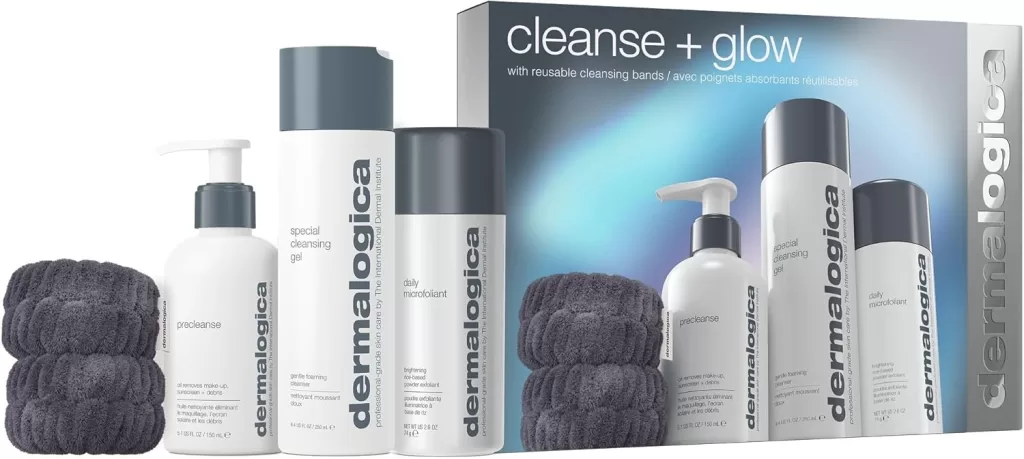
Dermalogica Cleanse and Glow Gift Set, Full-Size PreCleanse 150ml, Special Cleansing Gel 250ml, Daily Microfoliant 74g, Reusable Wristbands for Radiant,
Factors Influencing Your Skin’s Exfoliation Needs Over Time
Understanding your skin’s ever-changing needs is key to maintaining its health and vitality. Several factors can influence how much exfoliation your skin requires at different times:
- Hormonal Changes: Fluctuations in hormones, such as those experienced during puberty, menstruation, pregnancy, or menopause, can alter skin texture and oil production. This shift might increase or decrease your skin’s need for exfoliation.
- Weather Variations: The climate and seasons play a significant role in your skin’s behavior. Colder, drier months often lead to flaky skin, while warmer, humid conditions might increase oiliness. Both scenarios demand different exfoliation routines.
- Age: As we age, our skin’s natural cell turnover rate slows down. Older skin may require more frequent exfoliation to help shed dead cells and maintain a fresh appearance.
- Lifestyle Factors: Diet, stress levels, and sleep patterns can affect your skin’s condition. For example, lack of sleep or high stress might lead to dullness, necessitating a boost in exfoliation.
- Skincare Products in Use: Ingredients in your current skincare regimen, such as retinoids or AHAs, can impact how often you should exfoliate. These products already promote cellular turnover, so extra exfoliation might not be needed often.
Incorporating a balanced exfoliation routine tailored to these diverse factors can help keep your skin in its best condition throughout the year. Always listen to your skin and adjust your regimen accordingly to meet its unique needs.
How Does Age Impact the Need and Method for Exfoliation?
As we age, our skin undergoes changes that alter its exfoliation needs and methods. Here’s a breakdown of what happens:
1. Decreased Cell Turnover:
With age, the natural process of cell turnover slows down. This means that older skin may require more regular exfoliation to maintain a bright and even complexion. By removing dead skin cells, exfoliation can help reveal fresh, vibrant layers beneath.
2. Thinning Skin:
While exfoliation becomes more important, it’s crucial to remember that aging skin often becomes thinner. This thinning occurs due to the depletion of lipids and collagen, which are essential for maintaining skin thickness and resilience. A gentler touch is needed to prevent irritation.
3. Enhanced Sensitivity:
As lipid and collagen levels decrease, your skin may become more sensitive. Choosing the right method of exfoliation is essential. For those with sensitive aging skin, gentler options like enzyme-based or chemical exfoliants—such as those containing lactic or polyhydroxy acids—can be a better fit than harsh physical scrubs.
4. Routine Adjustments:
Your exfoliation routine may need to evolve with age. It’s advisable to start slowly, perhaps once a week, and adjust based on how your skin responds. Listen to your skin’s needs and adapt your regimen accordingly.
In summary, while age increases the need for exfoliation to maintain skin radiance, it also calls for a more careful approach due to thinning and increased sensitivity. Adapting your methods to these changes ensures both effectiveness and skin health.
What Happens If You Exfoliate Too Often?
Signs of Over-Exfoliation
Over-exfoliating can disrupt your skin’s natural barrier, leading to visible and uncomfortable symptoms. Key signs include:
- Redness and irritation: Your skin may appear inflamed or feel tender to the touch.
- Increased sensitivity: Your skin might react more strongly to products or environmental factors like wind or sun.
- Dryness or flakiness: Over-exfoliation can strip away essential oils, leaving your skin parched.
- Excessive oil production: Your skin may overcompensate for the loss of moisture by producing more oil, leading to breakouts.
- Tightness or discomfort: Your skin may feel overly tight or uncomfortable after cleansing.
If you notice these signs, it’s important to scale back on exfoliation and focus on repairing your skin barrier. Use hydrating and soothing products like hyaluronic acid, ceramides, or centella asiatica. Temporarily simplify your routine to a gentle cleanser, moisturizer, and SPF until your skin recovers.
Signs of Under-Exfoliation
On the other hand, not exfoliating enough can also cause issues. Signs of under-exfoliation include:
- Dull, lifeless skin: A buildup of dead skin cells can make your complexion appear lackluster.
- Clogged pores and breakouts: Without regular exfoliation, dirt, oil, and dead skin can accumulate, leading to congestion and acne.
- Uneven skin texture: Your skin may feel rough or bumpy due to the lack of cell turnover.
- Poor product absorption: Skincare products may not penetrate effectively, reducing their efficacy.
If you’re under-exfoliating, consider incorporating a gentle exfoliant into your routine 1–2 times per week, depending on your skin type. Chemical exfoliants like AHAs (e.g., glycolic acid) or BHAs (e.g., salicylic acid) are often more effective and less abrasive than physical scrubs.
Finding the Right Balance
The key to effective exfoliation is moderation and customization. Factors like skin type, climate, and the strength of your exfoliant play a role in determining how often you should exfoliate. For most people, exfoliating 1–3 times per week is sufficient. Always listen to your skin—if it feels irritated or sensitive, reduce frequency. If it looks dull or congested, consider exfoliating slightly more often.
By paying attention to your skin’s signals and adjusting your routine accordingly, you can maintain a healthy, glowing complexion without overdoing it.
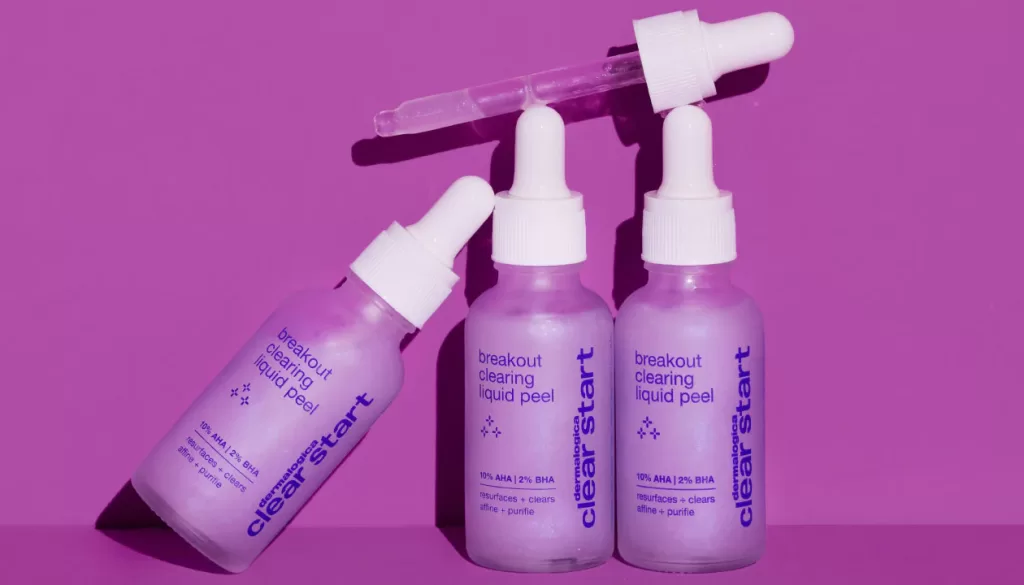
Choosing the Right Exfoliant for Your Skin
Exfoliation Routine Advice: Chemical Exfoliants
Chemical exfoliants are a popular choice for achieving smoother, brighter skin by dissolving dead skin cells and promoting cell turnover. They come in various forms, including liquids, gels, and toners, and are often compared to other exfoliation methods like physical scrubs or enzyme-based treatments. Liquid exfoliation, in particular, performs a similar function to enzyme exfoliants but typically works at a faster pace. Unlike enzymes, which break down keratin proteins in dead skin cells over time, liquid exfoliants use acids to immediately dissolve the bonds between skin cells, making them more effective for quick results. This method is also gentler than physical exfoliation, which can cause micro-tears in the skin if not used carefully.
Here’s a breakdown of the three main types of chemical exfoliants, their strengths, and their benefits:
- AHAs (Alpha Hydroxy Acids):
- Best for: Dry or sun-damaged skin.
- Examples: Glycolic acid (derived from sugar cane) and lactic acid (derived from milk).
- Benefits: AHAs are water-soluble and work on the skin’s surface to dissolve dead skin cells, improve texture, and boost hydration. They are particularly effective for addressing fine lines, uneven tone, and dullness.
- BHAs (Beta Hydroxy Acids):
- Best for: Oily, acne-prone, or combination skin.
- Examples: Salicylic acid (derived from willow bark).
- Benefits: BHAs are oil-soluble, allowing them to penetrate deeper into pores to dissolve excess sebum and debris. They are excellent for reducing congestion, preventing breakouts, and calming inflammation.
- PHAs (Poly Hydroxy Acids):
- Best for: Sensitive skin or those new to chemical exfoliation.
- Examples: Gluconolactone and lactobionic acid.
- Benefits: PHAs are larger molecules that work more gently on the skin’s surface compared to AHAs and BHAs. They provide similar exfoliating and hydrating benefits but are less likely to cause irritation, making them ideal for sensitive skin types.
Comparison to Other Exfoliation Methods:
- Liquid Exfoliation: Works quickly by dissolving dead skin cells with acids. It’s gentler than physical scrubs and faster than enzyme exfoliants.
- Physical Exfoliation: Uses granules or tools to manually slough off dead skin. While effective, it can be abrasive if overused.
- Enzyme Exfoliation: Relies on natural enzymes (e.g., papain from papaya or bromelain from pineapple) to break down dead skin cells over time. It’s gentle but slower-acting compared to liquid exfoliants.
By understanding the differences between these exfoliation methods and the types of chemical exfoliants available, you can choose the best option for your skin type and concerns. Always remember to patch-test new products and introduce them gradually to avoid irritation.

COSRX AHA 7 Whitehead Power Liquid 3.38 fl.oz / 100ml | Glycolic acid 7% Dark Spot Remover | Korean Skin Care, Animal Testing Free, Paraben Free…
Exfoliation routine advice: Physical Exfoliants
Physical exfoliants are products designed to manually remove dead skin cells through the use of small, rounded beads or natural particles. These ingredients, such as sugar, salt, jojoba beads, or finely ground nut shells, provide a gentle scrubbing action that can leave the skin feeling smoother and more refreshed. However, it’s important to avoid harsh scrubs containing large, jagged, or irregular particles (e.g., coarse walnut shells or overly abrasive materials), as these can cause microtears in the skin, leading to irritation, sensitivity, or even long-term damage.
Detailed Characteristics of Physical Exfoliants
Physical exfoliants come in various forms, each suited to different skin types and preferences:
- Granular Scrubs: These contain small, rounded particles like sugar, salt, or synthetic beads that gently slough off dead skin cells.
- Natural Ingredients: Scrubs with coffee grounds, oatmeal, or rice bran offer exfoliation while often providing additional skincare benefits, such as antioxidants or soothing properties.
- Tools: Muslin cloths, flannels, or soft cleansing brushes can be used as milder alternatives to granular scrubs, offering a gentler exfoliation method for sensitive skin types.
Potential Drawbacks of Physical Exfoliation
While physical exfoliation can be effective, it is not without risks:
- Microtears: Harsh or overly abrasive scrubs can create tiny scratches on the skin’s surface, compromising the skin barrier and increasing the risk of irritation or infection.
- Over-Exfoliation: Excessive or aggressive use of physical exfoliants can strip the skin of its natural oils, leading to dryness, redness, and sensitivity.
- Unsuitable for Certain Skin Types: Those with sensitive, acne-prone, or inflamed skin (e.g., rosacea or eczema) may find physical exfoliants too irritating and should opt for gentler alternatives.
Best Practices for Using Physical Exfoliants
- Choose the Right Product: Opt for scrubs with fine, rounded particles and avoid those with jagged or irregular textures.
- Be Gentle: Use light pressure and circular motions to avoid damaging the skin.
- Limit Frequency: Exfoliate no more than 2-3 times per week, depending on your skin type and tolerance.
- Follow Up with Hydration: Always moisturize after exfoliation to restore the skin’s moisture barrier.
By understanding both the benefits and potential risks of physical exfoliation, you can make informed decisions about incorporating it into your skincare routine. For those with sensitive skin or concerns about irritation, chemical exfoliants (such as AHAs or BHAs) may be a safer and equally effective alternative.
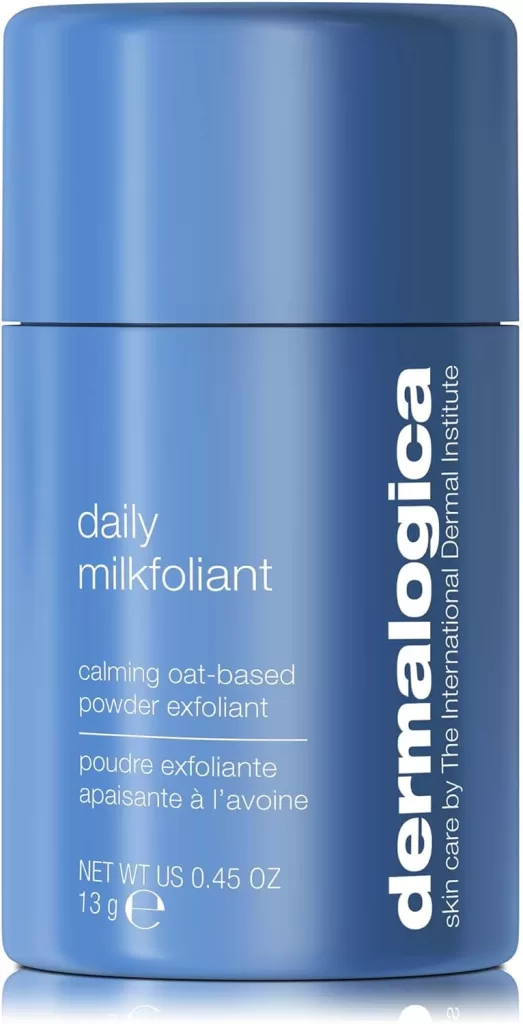
Dermalogica Daily Milkfoliant Exfoliator 13g – Vegan Exfoliating Powder with Coconut Milk for Smoother, Softer Skin, Combats Skin Sensitivity, Redness and…
Exfoliation routine advice: Enzyme Exfoliants
Enzyme exfoliants, derived from fruits such as papaya (papain) and pineapple (bromelain), are a gentle yet effective option for exfoliation, particularly suited for sensitive skin types. These natural enzymes work by breaking down the protein bonds (keratin) that hold dead skin cells together, essentially “nibbling away” at the surface layer of dead skin without the need for physical scrubbing or harsh chemicals. This process, known as enzymatic exfoliation, is non-abrasive and helps to reveal smoother, brighter skin while minimizing irritation.
The mechanism is simple yet fascinating: the enzymes act like tiny molecular scissors, selectively targeting and dissolving dead skin cells without disrupting the healthy, living cells beneath. This makes enzyme exfoliants an excellent choice for those with sensitive or reactive skin, as well as for individuals seeking a more gradual and gentle approach to exfoliation.
Frequency of Use:
Due to their mild nature, enzyme exfoliants can be used more frequently than other exfoliation methods, such as physical scrubs or chemical exfoliants like AHAs or BHAs. For most skin types, enzyme exfoliation can be incorporated into a skincare routine 2-3 times per week. However, for those with particularly sensitive skin, starting with once a week and gradually increasing frequency as tolerated is recommended. In some cases, gentle enzyme exfoliants can even be used daily or multiple times a day, depending on the product’s formulation and the individual’s skin tolerance. Always follow the instructions on the product label and monitor your skin’s response to determine the ideal frequency for your needs.
By understanding how enzyme exfoliation works and its gentle nature, you can confidently integrate this method into your skincare routine to achieve a smoother, more radiant complexion without over-stressing your skin.
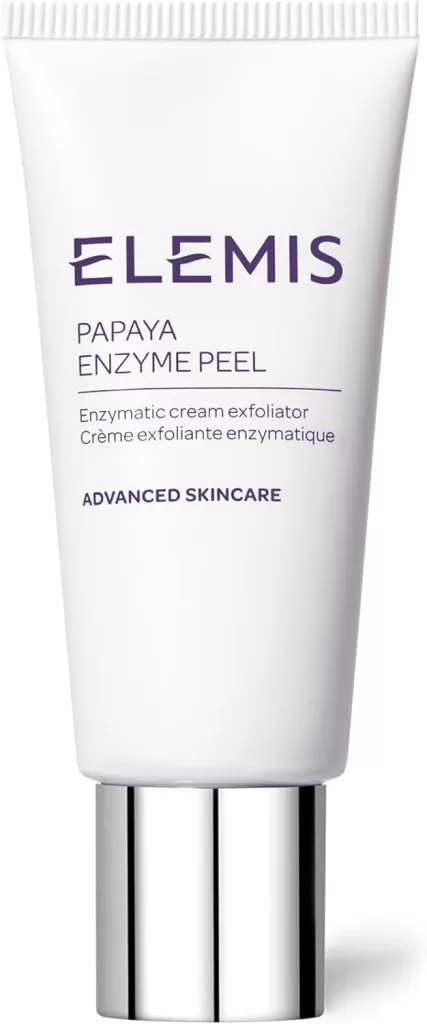
ELEMIS Papaya Enzyme Peel, Gentle Face Exfoliator Infused with Natural Fruit Enzymes, Non-Abrasive Cream Exfoliator to Smooth and Revitalise, Facial..
Tips for a Balanced Exfoliation Routine
- Patch Test New Products: Test exfoliants on a small area to ensure your skin can tolerate them.
- Avoid Overlapping Ingredients: Don’t combine multiple exfoliants (e.g., retinol and AHAs) in the same routine unless directed by a dermatologist.
- Follow Up with SPF: Exfoliation increases sun sensitivity, so always wear sunscreen during the day.
- Hydrate After Exfoliating: Replenish moisture with a nourishing moisturizer to protect your skin barrier.
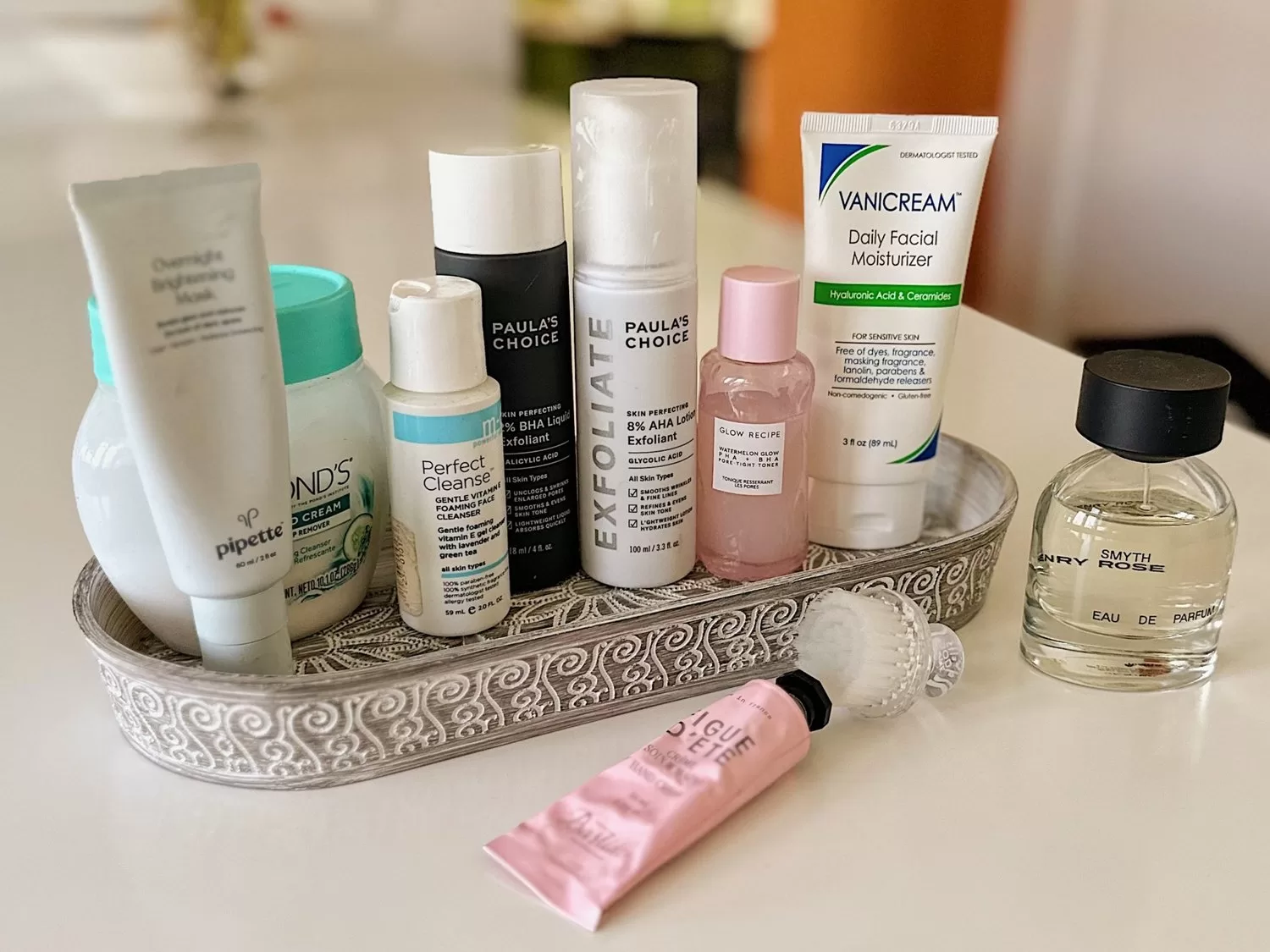
How to Build an Effective Skincare Routine
Creating an effective skincare routine can feel overwhelming with so many products and steps to choose from. However, the key to glowing, healthy skin is finding a regimen that works for your skin type and sticking with it. Whether you’re new to skincare or looking to refine your existing routine, this guide will help you…
FAQs
Can I Exfoliate Daily?
Daily exfoliation is generally not recommended unless using very mild products, like some enzyme-based or liquid exfoliants designed for everyday use.
What’s Better: Chemical or Physical Exfoliants?
Both have their benefits. Chemical exfoliants are typically gentler and more effective for deeper exfoliation, while physical exfoliants provide instant smoothness.
Is Exfoliation Necessary for All Skin Types?
Yes, but the method and frequency should be tailored to your skin type to avoid irritation.
Final Thoughts: Exfoliation routine advice
Finding your ideal exfoliation routine can transform your skincare results. By understanding your skin type and choosing the right exfoliants, you can enjoy smoother, brighter skin without compromising your skin barrier.

Explore more articles like this @ Where And How Resources
If you found this article helpful, don’t forget to share it with your friends and followers!

